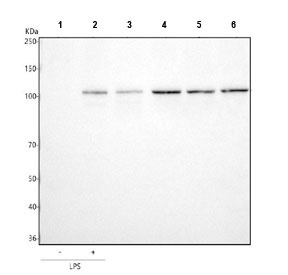- Tel: 858.663.9055
 Email: info@nsjbio.com
Email: info@nsjbio.com
- Tel: 858.663.9055
- Email: info@nsjbio.com
Innate Immunity Marker Antibody reagents target proteins central to the body’s first line of defense. Innate immunity functions as a rapid-response system that recognizes pathogens through conserved molecular patterns. Markers of innate immunity include pattern recognition receptors (PRRs), cytokines, chemokines, and cell-surface proteins expressed by innate immune cells such as macrophages, neutrophils, dendritic cells, and natural killer (NK) cells.
Unlike adaptive immunity, which relies on antigen-specific receptors and memory, innate immunity provides immediate and broad-spectrum protection. Dysregulation of innate responses contributes to infection, autoimmunity, inflammatory disorders, and cancer. The Innate Immunity Marker Antibody enables researchers to study these proteins with precision, while Innate Immunity Marker Antibodies more broadly support investigations into signaling pathways, pathogen recognition, and immune regulation.
NSJ Bioreagents offers Innate Immunity Marker Antibodies validated for immunohistochemistry, western blotting, immunofluorescence, ELISA, and flow cytometry. Each Innate Immunity Marker Antibody is rigorously tested for specificity, ensuring accurate detection of target proteins without cross-reactivity.
By selecting Innate Immunity Marker Antibodies from NSJ Bioreagents, researchers gain reagents optimized for reproducibility and clarity. Our antibodies deliver strong staining in immune tissues, consistent detection in protein assays, and reliable results across experimental applications. Comprehensive datasheets, recommended controls, and validated protocols provide additional support for achieving reproducible outcomes.
The Innate Immunity Marker Antibody has broad utility across immunology, infection biology, oncology, and translational medicine.
Innate Immunity Marker Antibodies target proteins such as Toll-like receptors (TLRs) and NOD-like receptors (NLRs).
The Innate Immunity Marker Antibody helps study how cells recognize bacterial, viral, and fungal pathogens.
Innate Immunity Marker Antibodies support discovery of host–pathogen interactions.
Innate Immunity Marker Antibodies detect cytokines such as IL-1β, TNF-α, and interferons.
The Innate Immunity Marker Antibody supports research on acute inflammation and systemic immune responses.
Innate Immunity Marker Antibodies are applied in studies of autoimmunity and chronic inflammation.
Innate Immunity Marker Antibodies highlight macrophages, dendritic cells, and neutrophils.
The Innate Immunity Marker Antibody identifies NK cell markers in flow cytometry.
Innate Immunity Marker Antibodies support studies of immune cell trafficking and activation.
Innate Immunity Marker Antibodies are applied in models of viral and bacterial infection.
The Innate Immunity Marker Antibody detects early immune signaling cascades in host tissues.
Innate Immunity Marker Antibodies help evaluate responses to vaccines and adjuvants.
Innate Immunity Marker Antibodies identify immune checkpoints and tumor-infiltrating innate immune cells.
The Innate Immunity Marker Antibody is used to study NK cell responses in cancer models.
Innate Immunity Marker Antibodies support biomarker discovery in immuno-oncology.
Innate Immunity Marker Antibodies validate biomarkers for novel immunotherapies.
The Innate Immunity Marker Antibody supports preclinical trials of immune-modulating drugs.
Innate Immunity Marker Antibodies contribute to diagnostics in infectious and inflammatory diseases.
Innate immunity forms the foundation of host defense, shaping adaptive responses and influencing disease outcomes. The Innate Immunity Marker Antibody provides a powerful tool for detecting and characterizing innate immune proteins, while Innate Immunity Marker Antibodies more broadly support immunology, oncology, and infectious disease research.
In basic science, Innate Immunity Marker Antibodies clarify mechanisms of pathogen recognition and signaling. In disease research, the Innate Immunity Marker Antibody highlights dysregulated innate responses in infection, autoimmunity, and cancer. In translational medicine, Innate Immunity Marker Antibodies validate therapeutic targets and support biomarker development.
Clinically, innate immune markers are used in diagnostic panels, vaccine evaluation, and monitoring of immunotherapy responses. By providing accurate detection, the Innate Immunity Marker Antibody links fundamental research with clinical application, ensuring progress in both discovery and patient care.
Innate immunity is a critical first defense system against pathogens and disease. The Innate Immunity Marker Antibody equips researchers and clinicians with a reliable tool for detecting innate immune proteins, while Innate Immunity Marker Antibodies more broadly support discoveries in immunology, infection biology, oncology, and translational medicine. By ensuring specificity and reproducibility, these antibodies remain indispensable for advancing biomedical research and improving clinical outcomes.

Western blot testing of human 1) ThP-1 without LPS treatment, 2) ThP-1 with LPS treatment, 3) HaCaT, 4) PC-3, 5) Caco-2 and 6) HepG2 cell lysate with TLR2 antibody. Predicted molecular weight: 85-90 kDa.
|
| ||

|